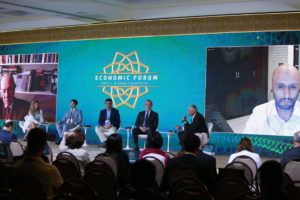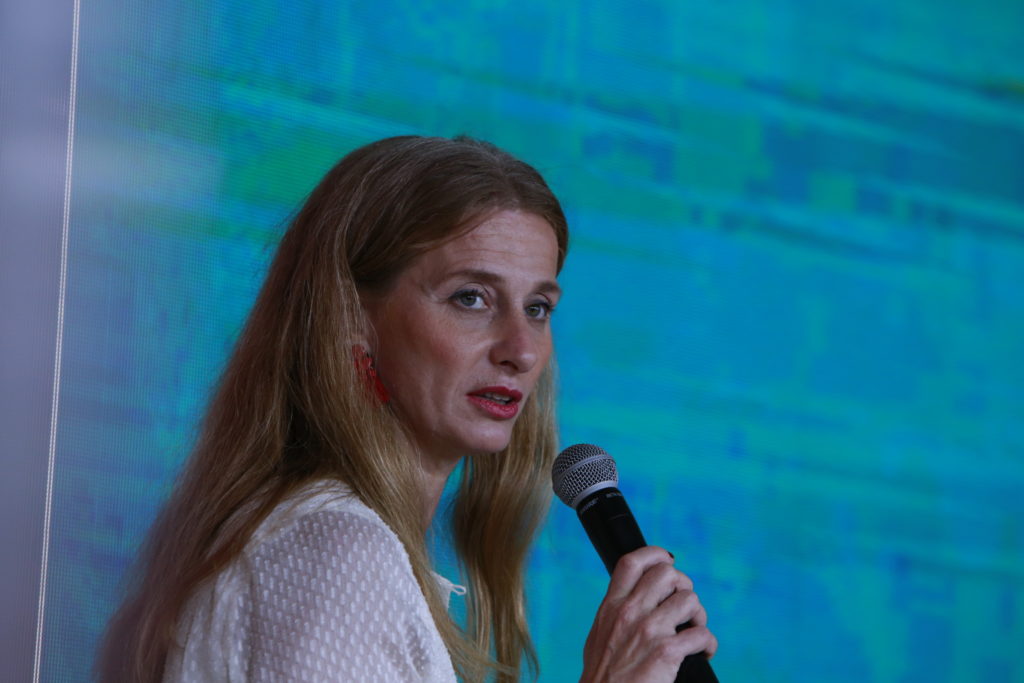São Paulo – A world in pandemic, an inflated, stagnant economy, a war in the heart of Europe, and migration flows. What do Brazil and the Arab countries can and should do in this complex landscape? Moderated by Carolina Larriera (pictured above), cofounder of the Sérgio Vieira de Mello Center, the first panel of the event featured six participants that brought answers to many of these questions. Carolina, who’s the widow of Sérgio Vieira de Mello, opened the roundtable by highlighting the long-standing relations between Brazil and the Arab countries, and pointing out her experiences in Iraq as a United Nations employee and major events hosted in the Arab countries such as the World Cup to take place later this year, Dubai’s Expo 2020, and the COP 27 to take place in Egypt.
The first to speak was ambassador Rubens Barbosa, president of the Institute of International Relations and Foreign Trade (IRICE), who highlighted the three key opportunities that Brazil should seize to enhance its relations with the Arab countries in this time of crisis: Food security, logistics, and infrastructure. “The Arab countries are starting to buy wheat from Brazil due to the war in Ukraine, a major wheat producer and exporter,” he stressed. “We hope that Brazil becomes self-sufficient in wheat and exports more and more, investing in programs like the one that plans on boosting wheat production in the Cerrado.”

Barbosa also highlighted the importance of having a direct, permanent shipping route with the Arab world. He finished by pointing out that the country has invested in renewing and creating concession of ports, which are vitally important to increase the trade flow between Brazil and the 22 Arab countries.
Youssef Cherif, director of Tunisia’s Columbia Global Traders, gave a brief portrait of the Arab world now. He started with what he calls a “pessimistic view” by recalling that the Arab Spring, which took place over ten years ago, didn’t brough the freedom and change that it was expected. On the contrary, more authoritarian regimes, civil wars and foreign interventions have arisen – a somber, chaotic landscape, he summed up. On the other hand, he pointed out that countries like the United Arab Emirates and Qatar grew richer over the period and invested in their populations. Another positive aspect was the withering of ISIS. He also stressed that old local enemies that warred among themselves, particularly in the Gulf, are now doing business, which makes it easier for outside countries like Brazil. Cherif finished by pointing out that the Arab countries have much to learn from Brazil, particularly the serious way of doing business.
New energy sources

A more realistic view on new energy sources was the center of the speech by Omar Al-Ubaydli, research director of Bahrain Center for Strategic, International and Energy Studies. Al-Ubaydli talked about how the fuel fossil transition is costly and time-consuming. And he raised an interesting point: Much of the sustainable technology is developed by temperate countries and when used in hot countries like the Arabs, they tend not to work or have their effectiveness reduced. Dust, for example, which is very common in many Arab countries, causes problems in wind turbine paddles. Ideally, he said, these technologies should be developed by the Arab countries themselves. “And since many countries have climates similar to ours, they could be exported later,” he said. Morocco and the UAE have invested in this front. “It’s a chance for the Arab countries to rediscover their historical inventiveness,” he finished.
Time for the periphery

New Development Bank president Marcos Troyjo brough a more optimistic perspective in his speech. Despite the four converging points that impact the entire world today – the coronavirus pandemic, the worst economic development since the Wall Street Crash of 1929, the stagflation similar to the 70s and 80s, and the war in Ukraine – periphery countries have seen an important growth. According to the International Monetary Fund (IMF), the E7 (consisting of China, India, Brazil, Russia, Indonesia, Mexico and Turkey) will have a combined GDP, in terms of purchasing power parity, of USD 60 trillion, while the combined GDP of the traditional G7 (United States, Japan, Germany, United Kingdom, France, Italy and Canada) will be USD 49 trillion.
“The E7 is already bigger than the G7, and even if you take aside China on one hand and the US on the other, it is still bigger,” Troyjo stressed, pointing out that the emerging economies have robust growth forecasts for 2022, as in the case in India (8-9%) and Egypt (5.5-6%). “In 2021, Brazil exported more to Singapura than to Germany, more to Egypt than to Australia. Value chains are being rewritten, and the future is on the emerging countries.
The mindset changed, so did business
International and geopolitical events are not the only ones that cause an impact and create opportunities. Changes occur in the microeconomy, too, in people’s daily lives, and new trends and behaviors that demand a new way of thinking. Rafael Cervone, president of the Center of Industries of the State of São Paulo (CIESP) and 1st vice president of the Federation of Industries of the State of São Paulo (FIESP), mentioned the experience of the textile companies with a new way of consuming, particularly driven by the pandemic. “Now you can choose an outfit online, with the help of a digital mirror, and have this outfit delivered to you within 17 minutes by a drone,” he said.

The mindset changed, so did the business model. “It’ll be an increasingly lean, digitized model that is closer to the consumer in order to reduce distances and the environmental impact, thus putting into question the model of China as the world’s leading clothing supplier,” Cervone said. According to him, within four years, 40,000 companies in the state of São Paulo will be trained within this new model. The schools run by FIESP/CIESP, like the SENAI network, have also changed their way of educating, increasingly focused on soft skills like resilience, adaptability, flexibility, and age, gender and race diversity and inclusion.
Alberto Pfeifer, executive coordinator of the Strategic Analysis Group of the University of São Paulo (USP) finished the panel by pointing out that digitization and democracy must go together, and that democracy is not only about voting but that everyone is more and more responsible for the good global governance. Pfeifer pointed out that another D besides digitization and democracy: demography. The migration flows ushered in by the global warming and climate change create new demographic settings. “And talking about demography is talking about people, about human relations, which is what drives everything that we’re discussing here,” Pfeifer stressed.
The Economic Forum Brazil & Arab Countries is held by the ABCC in partnership with the Union of Arab Chambers, supported by the League of Arab States and sponsored by Travel Plus, Brazil Trade and Investment Promotion Agency (ApexBrasil), Fambras Halal, Embraer, Itaipu Technology Park, Pantanal Trading, Embratur, Khalifa Industrial Zone Abu Dhabi (KIZAD), Cdial Halal, Modern Living, BRF, Egyzone/Am Development, Antika/Openet BV, First Abu Dhabi Bank, Egyptian Financial & Industrial Co. (EFIC), Suez Company for Fertilizers Production (SCFP), Boa Esperança Agriculture Cooperative (CAPEBE), Prima Foods, and Afrinvest.
Here’s more on the Economic Forum Brazil & Arab Countries.
Translated by Guilherme Miranda




